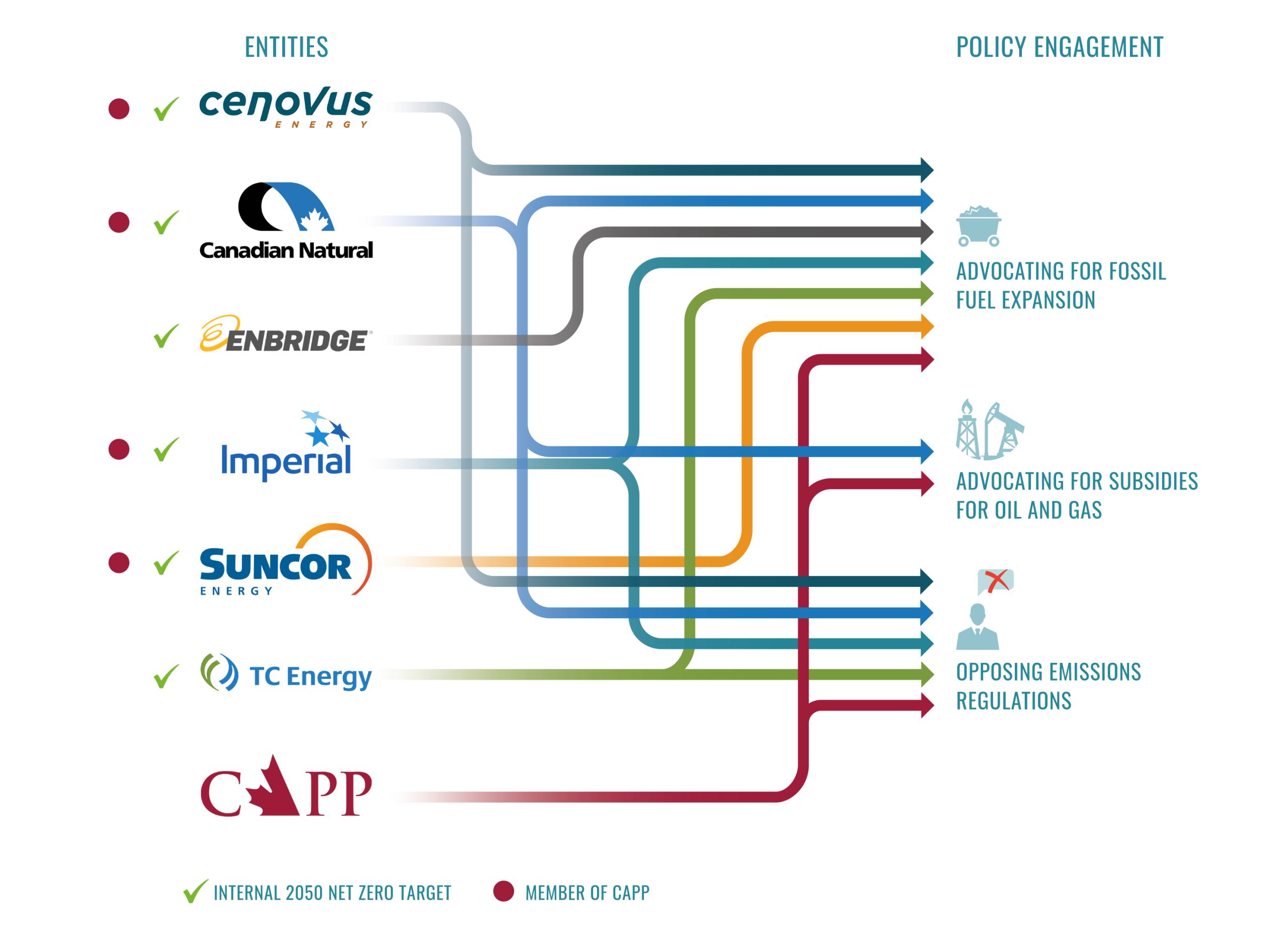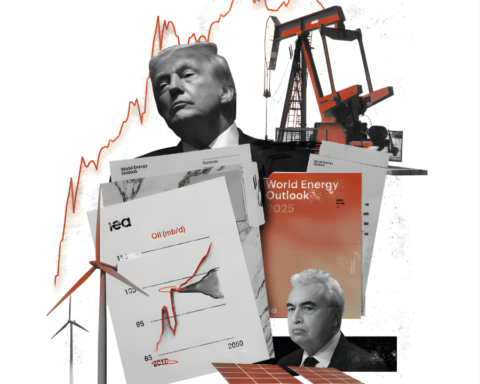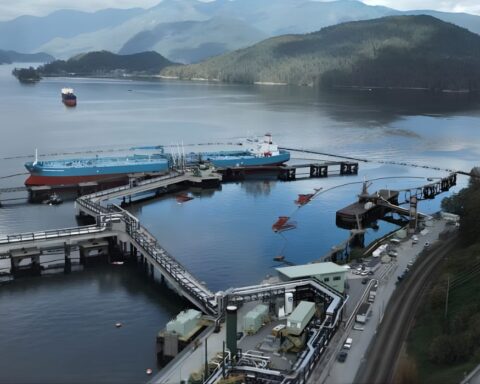The Canadian oil and gas industry is engaging in greenwashing by endorsing a 2050 net-zero target while actively lobbying against measures that would achieve that climate goal, international non-profit InfluenceMap says in a report.
U.K.-based InfluenceMap – which is funded by major foundations in Europe and the United States – analyzed the climate policy engagement of the six largest oil and pipeline companies headquartered in Canada, as well as the Canadian Association of Petroleum Producers (CAPP). It scored them on three key issues: whether they advocate for fossil fuel expansion; whether they advocate for increased subsidies; and whether they oppose emissions regulations.
“Despite the Canadian oil and gas sector’s widespread use of net zero commitments and narratives, the industry remains strategically opposed to science-based policy to deliver net zero targets in line with limiting warming to 1.5°C,” the report said.
The InfluenceMap report builds on the work of an expert panel established by United Nations Secretary General António Guterres and chaired by former federal environment minister Catherine McKenna. The expert panel report said companies’ net-zero commitments are credible only if they support effective climate regulations in their lobbying and other policy engagement.
McKenna echoes the InfluenceMap criticism of Canadian oil and pipeline companies.
They “continue to advertise that they’re committed to net zero while lobbying against the climate action needed to make this goal possible,” she told Corporate Knights. McKenna stressed that companies are failing to significantly invest in the technology solutions that they espouse, despite their record profits in 2022. Meanwhile, they’re hiking dividends and share buybacks.
Pathways Alliance, which represents the largest oil sands producers, has laid out a plan that it says will cut emissions by 20 megatonnes by 2030 and achieve net-zero emissions in its operations by 2050.
The group has launched a major advertising campaign touting its climate plan, including frequent television spots. However, McKenna argues that it cannot be taken seriously until the companies allocate major capital spending to it and align their executives’ compensation to provide incentives for environmental improvement. Suncor, which InfluenceMap ranked as a leader among Canadian companies, recently announced it has appointed as its new chief executive Rich Kruger, former CEO at Imperial Oil Ltd., which received the lowest marks in InfluenceMap’s ratings.
In a pre-budget submission to the Commons finance committee released in October, CAPP said it supports “the Government of Canada’s desire to create a path for meeting its international climate change objectives.” It criticized specific measures – such as the proposed cap on oil and gas emissions – as unworkable and uneconomic.

However, the InfluenceMap analysts conclude those commitments lack credibility. “The Canadian oil and gas sector is generally positioned against ambitious climate policy action” needed to meet the long-term targets the companies say they support, the report said.
The International Energy Agency and the Intergovernmental Panel on Climate Change (IPCC) “have stressed the need for decisive policy interventions by governments in order to drive the energy transition and emissions reduction,” Sofia Basheer, the author of the report, said in an email.
“Most of the pathways recognized by the IPCC to get there involve substantial reductions in fossil fuels,” she said.
CAPP argues that, while the oil and gas emissions cap would force industry to cut back its production, other global producers would pick up the slack, resulting in no reduction in global emissions. The industry argues it should be encouraged to increase production if it can achieve emissions intensity lower than the global average.
The InfluenceMap report also notes that Canadian companies are lobbying for more government support to finance their adoption of the key technologies needed to reduce emissions in their operations, especially the use of carbon capture and storage (CCS).
Most of the pathways recognized by the IPCC to get there involve substantial reductions in fossil fuels.
–Sofia Basheer, analyst with InfluenceMap
In its pre-budget submission, Pathways Alliance calls for an expansion of the tax credit proposed by the federal government to cover operating costs as well as initial construction costs. It also urged Ottawa to adopt a “contract for differences” plan that would amount to an insurance policy to protect its investment if a future government scrapped the carbon tax or failed to follow through on planned increases.
In response to the InfluenceMap report, Cenovus Energy reiterated its commitment to reduce GHGs from its operations by 35% by 2035 and achieve net-zero emissions by 2050. “This will help ensure Cenovus remains resilient and can play an important role as the world moves toward a lower-carbon future,” the company said in an emailed statement. Cenovus said it reduced its methane emissions by 520,000 tonnes in 2021, and captured the equivalent of 90,000 tonnes of CO2 from its initial CCS facilities.
The InfluenceMap report notes that the IPCC has urged governments to end fossil fuel subsidies in order to hasten the transition to non-emitting energy sources. The call from Canadian oil companies for government support is “misaligned with IPCC guidance on fossil fuels,” it said.
The report noted that the industry has employed dubious narratives to argue for continued buildout of fossil fuel infrastructure and productive capacity, even though greater production of oil and gas would undermine Canada’s effort to achieve its international climate commitments. Those narratives include the claim that greater production of Canadian oil and natural gas could actually reduce global emissions and that it is needed to secure global energy security in the face of Russia’s invasion of Ukraine.
All told, the InfluenceMap report suggests that the Canadian oil and gas industry remains far behind the curve – and even behind some of its European competitors – in taking the actions that the world needs to avert the most disastrous impacts of climate change. High-level corporate commitments need to be backed up with aggressive government regulations that speed up the pace of change.







